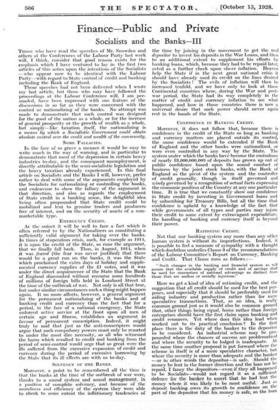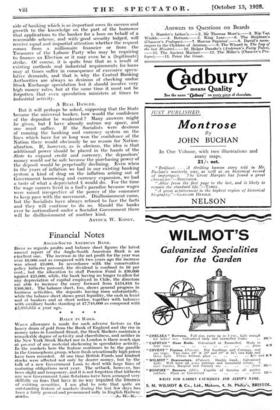Finance—Public and Private
Socialists and the Banks—III
THOSE who have read the speeches of Mr. Snowden and others at the Conferences of the Labour Party last week will, I think, consider that good reason exists for the emphasis which I have ventured to lay in the first two articles of this series upon the intentions of the Socialists —who appear now to be identical with the Labour Party—with regard to State control of credit and banking including the Bank of England.
Those speeches had not been delivered when I wrote my last article, but those who may have followed the proceedings at the Labour Conference will, I am -per- suaded, have been impressed with one feature of the discussions in so far as they were concerned with the control or -nationalizing of the banks. No attempt- was made to demonstrate that such control was designed for the good of the nation as a whole, or for the increase of general prosperity or the growth of wealth as a whole, but simply—like taxation itself, the nationalizing is a means by which a Socialistic Government could obtain absolute control over the credit and wealth of the community.
SOME FALLACIES.
In the face of so grave a menace it would be easy to write much in the way of warning, and in particular to demonstrate that most of the depression in certain heavy industries to-day, and the consequent unemployment, is directly attributable to the semi-socialistic legislation and the heavy taxation already experienced. In this final article on Socialists and the Banks I will, however, prefer rather to deal with some of the arguments employed by the Socialists for nationalizing or controlling the banks, and endeavour to show the fallacy of the argument in that direction, and also as regards the employment of State credit in a banking sense, the delightful idea being often propounded that State credit could be mobilized and lent to genuine traders and producers free of interest, and on the security of assets of a non- marketable type.
EMERGENCY CREDIT.
At the outset it will be well to face a fact which is often referred to by the Nationalizers as constituting a sufficiently valid argument for taking over the banks. In times of stupendous crisis, such, for example as 1914, it is upon the credit of the State, so runs the argument, that we finally fall back. Thus, in August, 1914, when it was feared (the fear was never justified) that there would be a great run on the banks, it was the State which proclaimed the extra days of holiday and supple- mented currency supplies of the £1 notes, and it was under the direct acquiescence of the State that the Bank of England discounted without recourse some hundreds of millions of foreign bills held in Lombard Street at the time of the outbreak of war. Not only is all that true, but under similar circumstances such a thing might happen again. It no more affects, however, a general argument for the permanent nationalizing of the banks and of banking credit and currency than the fact that for a period, in the face of a national emergency, the State enforced active service at the front upon all men of certain age and fitness, establishes an argument in favour of permanent conscription. Indeed, it might truly be said that just as the anti-conscripters would argue that such compulsory powers must only be resorted to under the most dire necessity, so all who witnessed the harm which resulted to credit and banking from the period of semi-control would urge that so great were the ills suffered from the excessive expansion of credit and currency during the period of excessive borrowing by the State that its ill effects are with us to-day.
SOLVENCY OF THE BANKS. - Moreover, a point to be remembered all the time is that the banks at the time of the outbreak of war were, thanks to a sound system and sound management, in a position of complete solvency, and because of the soundness and efficiency of the system they were able to check to some extent the inflationary tendencies of the time by joining in the movement to get the real depositor to invest his deposits in the War Loans, and than to an additional extent to supplement his efforts by banking loans, which, because they had to be repaid later, acted as a further check upon sheer inflation. Heaven help the State if in the next great national crisis it should have already used its credit on the lines desired by the Socialists ! The evils of inflation will then be increased tenfold, and we have only to look at those Continental countries where, during the War and post- war period, the State had its way completely in the matter of credit and currency inflation • to see what happened, and how in those countries there is now a universal desire that such power should never again rest in the hands of the State.
CONFIDENCE IN BANKING CREDIT.
Moreover, it does not follow that, because there is confidence in the credit of the State so long as banking and currency matters are placed outside its control, the same confidence would be extended if the Bank of England and the other banks were nationalized, or were even controlled in any way by the State. The system under which the banks have become the custodians of nearly £3,000,000,000 of deposits has grown up out of public confidence based upon the sound conduct of business by the joint stock banks, with the Bank of England as the pivot of the system and the controller of credit generally, though in itself governed and wisely governed by a recognition of actual facts expressing the economic position of the Country at any one particular time. - It is true that we constantly show our confidence in State credit by investing in Government loans and by subscribing for Treasury Bills, but all the time that confidence is upheld by a knowledge of the fact that while governments of all types and parties may injure their credit to some extent by extravagant expenditure, the handling of banking and currency itself is beyond their power.
RATIONING CREDIT.
Not that our banking system any more than any other human sySteni is without its imperfections. Indeed, it is possible to feel a measure of sympathy with a thought which doubtless underlies Clause 3 of the recommendations of the Labour Committee's Report on Currency, Banking and Credit. That Clause runs as follows :--- "Such changes in the banking and financial system as will secure that the available supply of credit and of savings shall be used for enterprises of national advantage as distinct from those that are useless or socially injurious."
Here we get a kind of idea of rationing credit, and the suggestion that all credit should be used for the best pur- poses, and especially that it should be preferably used for aiding industry and production rather than for mere speculative transactions. That, as an idea, is really common ground just as it would also be common ground that, other things being equal, home rather than foreign enterprises should have the first claim upon banking and credit resources. Yet where does this idea lead when worked out to its practical conclusion ? In the first place there is the duty of the banker to the depositor to be considered. An industrial scheme may be pro- pounded where the chances of success are problematical and where the security to be lodged- is inadequate. At the same time another proposal is put forWard where the scheme in itself is of a more -speCulative character, but where the security is more than adequate and the banker —or in other words the depositor—is safe. Should the money be lent in the fon:her direction and the loan not be repaid, I fancy the depositors—even if they all happened to be Socialists—would not regard it as a sufficient defence for the banker to assert that he had. lent the money where it was likely: to be most useful. Just as deposit banking owes its growth to eonfidence on the part of the depositor that his money is safe, so the loan side of banking which is as important owes its success and growth to the knowledge on the part of the borrower that applications to the banker for a loan on behalf of a reasonable • scheme, and with-good security -lodged, will receive equal and impartial attention whether the request comes from a millionaire financier • or from the Treasurer of the Labour Party who may be requiring to finance an Election or it may even be a (legitimate) strike. Of course, it. is quite true that as a result of existing methods real industrial requirements for loans may at times suffer in consequence of excessive specu- lative demands, and that is why the Central Banking Authorities are always so desirous of checking undue Stock Exchange Speculation lest it should involve very high money rates, but at the same time it must not be forgotten that even speculation ministers at times to industrial activity.
A REAL DANGER.
But it will perhaps be asked, supposing that the State became the universal banker, how would the confidence of the depositor be weakened ? Many .answers might be given, but I have already outrun my space, and one must suffice. If the Socialists were desirous of running the banking and currency system on the lines which have for so long won the confidence of the Nation there would obviously be no reason for Nation- alization. If, however, as is obvious, the idea is that additional power should be placed in the hands of the State to expand credit and currency, the depositors' money would not be safe because the purchasing power of the deposit would be perpetually declining. Even when in the years of inflation we had in our existing banking system a kind of drag on the inflation arising out of Government borrowing and currency expansion, we had a taste of what a depreciated £ would do. For the time the wage earners lived in a fool's paradise because wages were raised irrespective of the power of the consumer to keep pace with the movement. Disillusionment came, but the Socialists have always refused to face the facts and they will continue to do so. Should the banks ever be nationalized under a Socialist Government there will be disillusionment of another kind.
ARTHUR W. KIDDY.









































 Previous page
Previous page